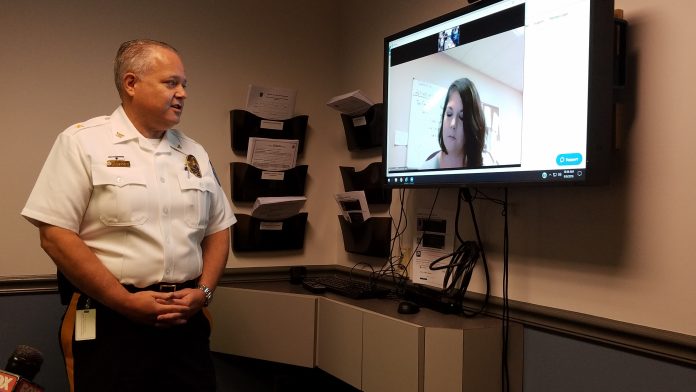When a person who’s battling addiction decides to get clean, steps toward recovery must be taken within minutes, according to Fred Harran, Bensalem Township Police Department’s director of public safety.
“When someone needs to get off drugs, when someone has that moment when they’re ready to quit, when they’re ready to get cured, when the disease has let its guard down a little bit, you’ve got about a five-minute window before they’re going to go get that next hit,” Harran said. “You don’t have days or hours. You have minutes. That’s how quickly addiction and this disease works.”
In order to get these individuals the treatment they need as quickly as possible, Bensalem Township Police Department has partnered with Gaudenzia and the Bucks County Drug & Alcohol Commission to launch BPAIR (Bensalem Police Assisting in Recovery Program) video screening assessments.
The first of its kind in the state of Pennsylvania, this new initiative against the “War on Drugs” enables Bensalem residents suffering from substance use disorder to voluntarily be assessed by a Gaudenzia representative via teleconferencing at the police station. The entire process, including the securing of a bed at a treatment facility, takes approximately 20 minutes, as opposed to the lengthy four hours of an in-person assessment.
The system was unveiled during a news conference at the police station, located at 2400 Byberry Road, on Monday, Sept. 9. Harran provided an in-depth demonstration.
When a BPAIR participant enters the station, they’ll first complete a consent form, which allows them to be searched for drugs. Harran stressed that if any are found, the person will not be arrested. Consent forms must also be completed for the Bucks County Drug & Alcohol Commission and Gaudenzia.
Next, the individual will enter a conference room, where a “Navigator” at the station will connect them to a Gaudenzia assessor, who will appear on a computer screen through live video chat. The assessor will gauge their needs, asking questions such as “Why did you come in today?” and “How long have you been using?” Once this information is collected, the Gaudenzia assessor will immediately begin searching for open spots at various treatment facilities.
“Gaudenzia will be responsible for placing that person, whether it be with us or someone else. We’ll do the brief assessment, we’ll determine if they are in need of detox. If they’re not, they’ll get a full assessment and then we’ll determine what kind of treatment they do need,” said Erin Pressel, chief strategy and business development officer for Gaudenzia. “We’re just looking forward to reducing these barriers and getting folks where they need to be as quickly as possible.”
Uber transportation to the facility, no matter the distance, is funded by the Kaitlin Murphy Foundation. The organization was founded in memory of Murphy, who died seven years ago from a heroin overdose.
“You hear a lot of stories about ‘no beds available.’ You have to just know where to look sometimes,” Harran said. “The last thing I want is for them to walk out of here unsatisfied or that we didn’t help. They’re going to go get their next high and that could be their last.”
Ultimately, the purpose of the BPAIR videoconferencing system is to reduce the hurdles of time and distance so that locals battling addiction can receive instant help. For Harran, who saw five overdoses in the township since the previous Friday night, it’s about acknowledging the epidemic and finding creative ways to end it.
“If we ignored it and buried our head in the sand, it’s going to get worse,” he said. “It’s not going to go away on its own.”
Joining Harran at the news conference was Rep. Gene DiGirolamo, who serves as chairman of the state House of Representatives’ Human Services Committee. The drug epidemic is something DiGirolamo understands firsthand – his oldest son is currently in successful long-term recovery after years battling a heroin addiction.
“Addiction is a disease that is in a crisis situation. I’m just tired and sick of talking to parents and family members that have dead children because of this dreaded disease,” he said. “It’s so important to realize that treatment works. When somebody wants to get into treatment, you’ve got to get them in as soon as possible.”
Also present was Bensalem Township Mayor Joseph DiGirolamo, Diane Rosati, executive director of the Bucks County Drug & Alcohol Commission, and Bucks County District Attorney Matthew D. Weintraub.
“The way to win this battle is to eliminate demand, and the best way to eliminate demand for illicit substances, controlled substances, is to get people treatment when they are absolutely most ready to accept it,” said Weintraub. “We’ve now bridged that gap. It’s telemedicine, essentially, at its most necessary.”
BPAIR video screening assessments, while in their pilot phase, are available Monday through Friday, from 8 a.m. to 4 p.m. Once it’s determined what the system is able to handle, it will be expanded to a 24/7 service. The goal is for it to eventually go countywide and then nationwide. ••
Samantha Bambino can be reached at [email protected]


